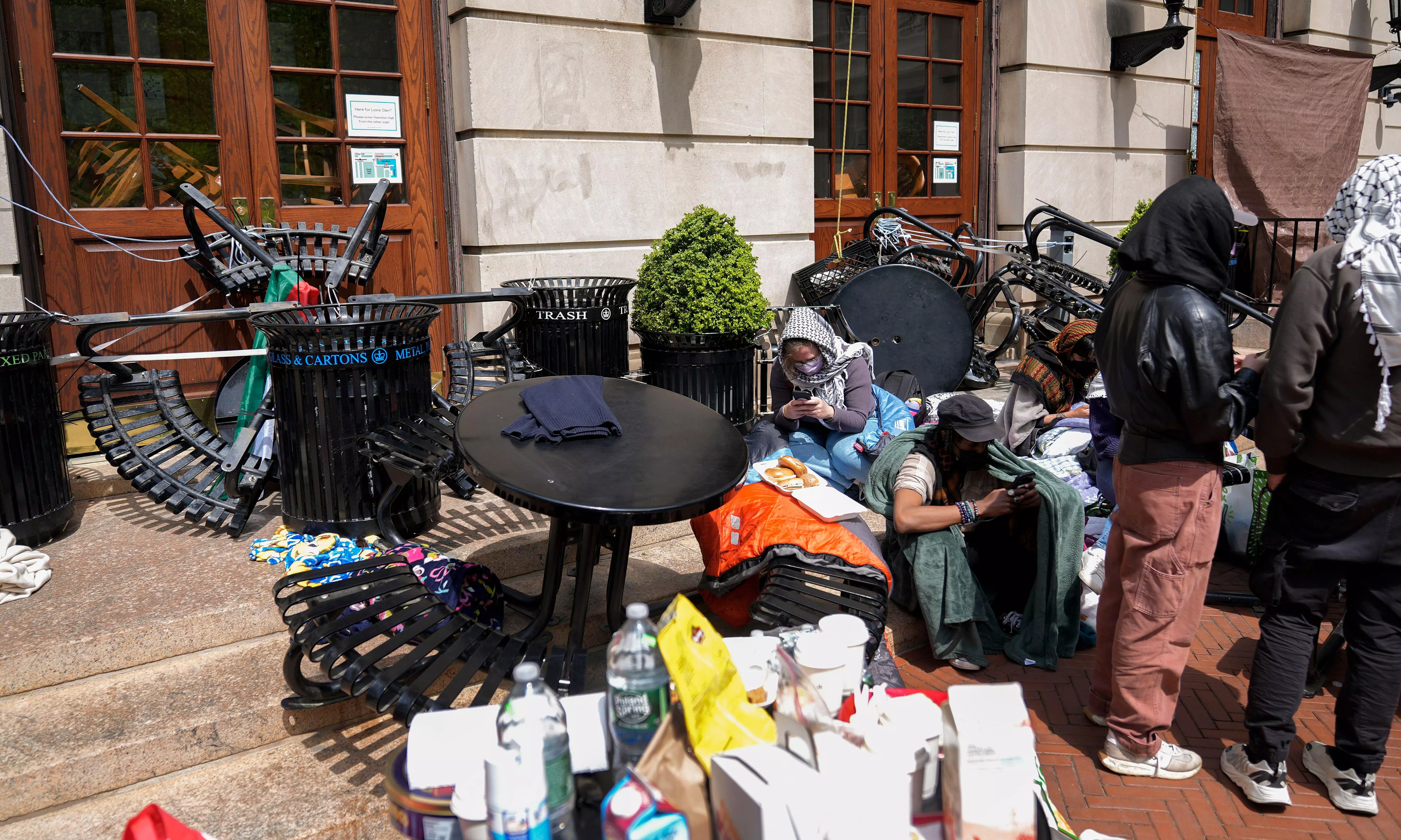Protesters Take Over Columbia University's Hamilton Hall in Escalation of Anti-war Demonstrations

New York: Dozens of protesters took over a building at Columbia University in New York early Tuesday, barricading the entrances and unfurling a Palestinian flag out of a window in the latest escalation of demonstrations against the Israel-Hamas war that have spread to college campuses nationwide.
Video footage showed protesters on Columbia's Manhattan campus locking arms in front of Hamilton Hall early Tuesday and carrying furniture and metal barricades to the building, one of several that was occupied during a 1968 civil rights and anti-Vietnam War protest on the campus. Posts on an Instagram page for protest organizers shortly after midnight urged people to protect the encampment and join them at Hamilton Hall. A Free Palestine banner hung from a window.
An autonomous group reclaimed Hind's Hall, previously known as Hamilton Hall, in honor of Hind Rajab, a martyr murdered at the hands of the genocidal Israeli state at the age of six years old, CU Apartheid Divest posted on X, formerly known as Twitter, early Tuesday.
The student radio station, WKCR-FM, broadcast a play-by-play of the hall's takeover which occurred nearly 12 hours after Monday's 2 pm deadline for the protesters to leave an encampment of around 120 tents or face suspension.
Representatives for the university did not immediately respond to emails requesting comment early Tuesday but the Public Safety department said in a statement that access to the Morningside campus has been limited to students living in the residential buildings and employees who provide essential services, such as dining, public safety and maintenance staff.
There was just one access point into and out of campus.
The safety of every single member of this community is paramount, the advisory said.
In the X post, protesters said they planned to remain at the hall until the university conceded to the CUAD's three demands: divestment, financial transparency and amnesty.
Universities across the US are grappling with how to clear out encampments as commencement ceremonies approach, with some continuing negotiations and others turning to force and ultimatums that have resulted in clashes with police. Dozens of people were arrested Monday during protests at universities in Texas, Utah, Virginia and New Jersey, while Columbia said hours before the takeover of Hamilton Hall that it had started suspending students.
The nationwide campus protests began as a response by some students to Israel's offensive in Gaza after Hamas launched a deadly attack on southern Israel on October 7.
Militants killed about 1,200 people, most of them civilians, and took roughly 250 hostages. Vowing to stamp out Hamas, Israel has killed more than 34,000 Palestinians in the Gaza Strip, according to the local health ministry.
Israel and its supporters have branded the university protests as antisemitic, while critics of Israel say it uses such allegations to silence opponents. Although some protesters have been caught on camera making antisemitic remarks or violent threats, organizers of the protests, some of whom are Jewish, say it is a peaceful movement aimed at defending Palestinian rights and protesting the war.
At the University of Texas at Austin, an attorney said at least 40 demonstrators were arrested Monday. The confrontation was an escalation on the 53,000-student campus in the state's capital, where more than 50 protesters were arrested last week.
Later Monday, dozens of officers in riot gear at the University of Utah sought to break up an encampment outside the university president's office that went up in the afternoon. Police dragged students off by their hands and feet, snapping the poles holding up tents and zip-tying those who refused to disperse. Seventeen people were arrested. The university says it's against code to camp overnight on school property and that the students were given several warnings to disperse before police were called in.
At Princeton University, 13 people were arrested Monday night including 11 students, after briefly occupying a building that houses its graduate school. They received summons for trespassing and have been barred from campus, President Christopher Eisgruber said in a statement.
The plight of students who have been arrested has become a central part of protests, with the students and a growing number of faculty demanding amnesty for protesters. At issue is whether the suspensions and legal records will follow students through their adult lives.
The Texas protest and others including in Canada and Europe grew out of Columbia's early demonstrations that have continued. On Monday, student activists defied the 2 pm deadline to leave the encampment. Instead, hundreds of protesters remained.

